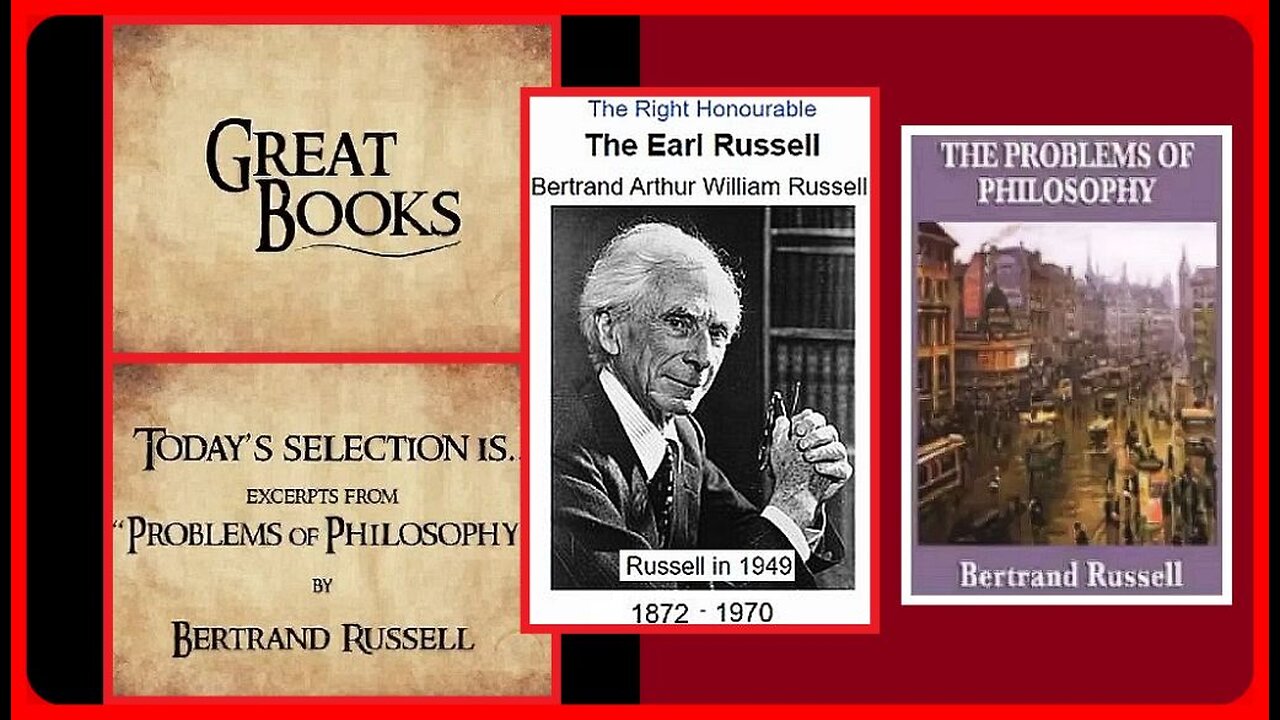Premium Only Content

📚 Great Books: 'The Problems of Philosophy' by Bertrand Russell ( 1872 - 1970 ) •🕞28m
Publication date 15 May 2015 • ( NCTV17 - Public Access TV, Naperville ) • Great Books: The Problems of Philosophy by Bertrand Russell • The Problems of Philosophy is a 1912 book by the philosopher Bertrand Russell, in which the author attempts to create a brief and accessible guide to the problems of philosophy. He introduces philosophy as a repeating series of (failed) attempts to answer the same questions: Can we prove that there is an external world❓ Can we prove cause and effect❓ Can we validate any of our generalizations? Can we objectively justify morality❓ He asserts that philosophy cannot answer any of these questions and that any value of philosophy must lie elsewhere than in offering proofs to these questions.
Focusing on problems he believes will provoke positive and constructive discussion, Russell concentrates on knowledge rather than metaphysics: If it is uncertain that external objects exist, how can we then know of them but by probability? There is no reason to doubt the existence of external objects simply because of sense data.
The book also looks at the question of mathematical truths and philosophy within mathematics, particularly the question of how pure mathematics is possible.
Russell guides the reader through his famous 1910 distinction between knowledge by acquaintance and knowledge by description and introduces important theories of Plato, Aristotle, René Descartes, David Hume, John Locke, Immanuel Kant, Georg Wilhelm Friedrich Hegel, and others to lay the foundation for philosophical inquiry by general readers and scholars alike.
In the following pages, I have confined myself in the main to those problems of philosophy regarding which I thought it possible to say something positive and constructive since merely negative criticism seemed out of place. For this reason, the theory of knowledge occupies a larger space than metaphysics in the present volume, and some topics much discussed by philosophers are treated very briefly, if at all.
— Bertrand Russell, Preface of The Problems of Philosophy
Russell called the book his 'shilling shocker' and saw it as a short, cheap book, written for a general audience; it has been his most-read book for decades. It has often been set as a textbook for philosophy students.
( 👉 https://en.wikipedia.org/wiki/The_Problems_of_Philosophy )
—— About Bertrand Russell: —— ( 👉 https://en.wikipedia.org/wiki/Bertrand_Russell )————
Bertrand Arthur William Russell, 3rd Earl Russell, OM, FRS (18 May 1872 – 2 February 1970) was a British mathematician, logician, philosopher, and public intellectual. He had an influence on mathematics, logic, set theory, and various areas of analytic philosophy.
He was one of the early 20th century's prominent logicians[8] and a founder of analytic philosophy, along with his predecessor Gottlob Frege, his friend and colleague G. E. Moore, and his student and protégé Ludwig Wittgenstein. Russell with Moore led the British "revolt against idealism". Together with his former teacher A. N. Whitehead, Russell wrote Principia Mathematica, a milestone in the development of classical logic and a major attempt to reduce the whole of mathematics to logic (see Logicism). Russell's article "On Denoting" has been considered a "paradigm of philosophy".
Russell was a pacifist who championed anti-imperialism and chaired the India League. He went to prison for his pacifism during World War I, and initially supported appeasement against Adolf Hitler's Nazi Germany, before changing his view in 1943, describing war as a necessary "lesser of two evils". In the wake of World War II, he welcomed American global hegemony in preference to either Soviet hegemony or no (or ineffective) world leadership, even if it were to come at the cost of using their nuclear weapons. He would later criticize Stalinist totalitarianism, condemn the United States' involvement in the Vietnam War, and become an outspoken proponent of nuclear disarmament.
In 1950, Russell was awarded the Nobel Prize in Literature "in recognition of his varied and significant writings in which he champions humanitarian ideals and freedom of thought". He was also the recipient of the De Morgan Medal (1932), Sylvester Medal (1934), Kalinga Prize (1957), and Jerusalem Prize (1963).
Source: 👉 https://archive.org/details/Great_Books_-_The_Problems_of_Philosophy_by_Bertrand_Russell
——• ➤✝️ "Page Chronicles" Channel & Operator DISCLAIMERS
📌 I do not own the ©️ Copyright / Licensing to this content - but it's posted Under FAIR USE. (Education)
-
 29:54
29:54
Michael Franzese
14 hours agoCan Trump accomplish everything he promised? Piers Morgan Article Breakdown
117K49 -
 2:08:19
2:08:19
Tactical Advisor
18 hours agoThe Vault Room Podcast 006 | Farwell 2024 New Plans for 2025
187K11 -
 34:12
34:12
inspirePlay
1 day ago $5.65 earned🏆 The Grid Championship 2024 – Cass Meyer vs. Kelly Rudney | Epic Battle for Long Drive Glory!
87.2K8 -
 17:50
17:50
BlackDiamondGunsandGear
15 hours ago $2.98 earnedTeach Me How to Build an AR-15
61.4K6 -
 9:11
9:11
Space Ice
1 day agoFatman - Greatest Santa Claus Fighting Hitmen Movie Of Mel Gibson's Career - Best Movie Ever
119K47 -
 42:38
42:38
Brewzle
1 day agoI Spent Too Much Money Bourbon Hunting In Kentucky
80.6K12 -
 1:15:30
1:15:30
World Nomac
1 day agoMY FIRST DAY BACK in Manila Philippines 🇵🇭
62.6K9 -
 13:19
13:19
Dr David Jockers
1 day ago $11.81 earned5 Dangerous Food Ingredients That Drive Inflammation
81.3K17 -
 1:05:13
1:05:13
FamilyFriendlyGaming
1 day ago $15.95 earnedCat Quest III Episode 8
131K3 -
 10:39
10:39
Cooking with Gruel
2 days agoMastering a Succulent London Broil
84.3K5